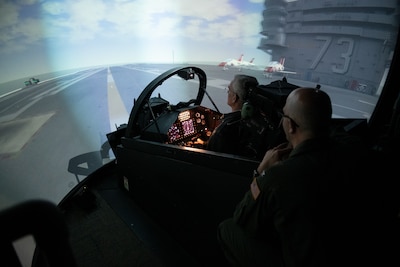
WASHINGTON —
The vice chairman of the Joint Chiefs of Staff spoke about leadership to educators responsible for training the next generations of military leaders at the Association of Military Colleges here last night.
Air Force Gen. Paul J. Selva used the experience of the Battle of Iwo Jima in February 1945 as an example of leadership in action and a time when normal men rose to sublime levels of leadership.
Iwo Jima was one of the bloodiest battles of World War II. The United States sent 70,000 Marines and sailors to assail the bastion in the Central Pacific. An unprecedented bombardment of the small island — some 74 days — had very little effect, because Japanese soldiers literally had dug into the island.
“Leadership is about inspiring people to do things they wouldn’t otherwise do — to do things they don’t believe they can do,” Selva said to the educators. “I imagine not many Marines wanted to charge ahead, directly into the barrage of fire that was being delivered upon them on Iwo Jima. Leaders have to figure out what skills we have to help others, and to inspire others to do things they certainly do not want to do — to accept those challenges that they believe are insurmountable.”
Historic Battle
All the firepower from battleships, cruisers and destroyers off the island, from aircraft strafing positions and from artillery reached a limit, and it was Marine riflemen who had to shoulder the burden of taking on the entrenched Japanese.
American leaders believed the battle would be over in days. But the island wasn’t secure for a month, at a cost of 21,000 Japanese dead. Some 6,800 Marines and sailors died in the battle, and more than 20,000 were wounded.
A total of 27 Medals of Honor were awarded for gallantry during the battle for Iwo Jima — the largest single-number of awards for a single battle in U.S. history.
“We are not genetically predisposed for leadership,” Selva said. “We’re actually predisposed, my theory is, to be good followers. And it is exceptional followers who become leaders of character. And it’s a learned trait, not an innate skill.”
These leadership traits can be taught, the general said. “If there’s a chance to build good leaders, it’s because they have role models,” he said. “They have people who are willing to share their skills and teach their skills. Because teaching leadership is a little bit about baring your soul. It’s a little bit about admitting your weaknesses. It’s a little bit about helping other people discover theirs. And it’s certainly about motivating them to overcome them.”



